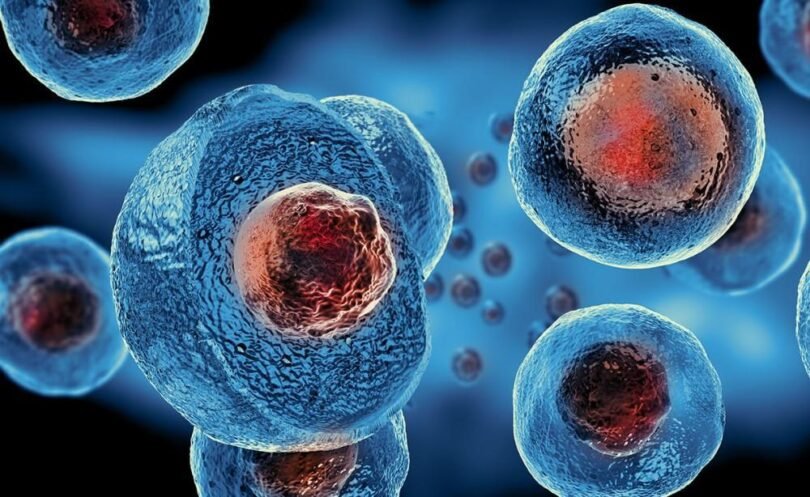Stem Cell Therapy at Plexus
Imagine your immune system being unable to distinguish your healthy cells from foreign cells, and causing the body to mistakenly attack healthy cells. This malfunctioning of the immune system is medically termed as an autoimmune disease.
Traditional treatment approaches aim to manage symptoms and curb immune system activity. However, over the last couple of decades a paradigm shift in the landscape of autoimmune disease treatment has led to stem cell therapy emerging as a revolutionary approach.
Let’s take a closer look at the nuances of stem cell therapy for autoimmune conditions, with a focus on mesenchymal stem cell transplant, spearheaded by India’s no. 1 stem cell specialist, Dr Na’eem Sadiq, at India’s first ISO-certified stem cell research centre, Plexus.
What are autoimmune diseases?
Our immune system is a collection of cells, proteins, and organs. It protects the body from infection, illness, disease (caused by foreign substances such as viruses, bacteria, parasites, fungi,). The immune system attacks and destroys these substances before they have a chance to attack the body.
Autoimmune diseases cause a perfectly healthy immune system to attack our body instead of protecting it. It’s like a self-goal in football or hockey. But its repercussions can be quite serious and devastating, affecting several tissue types and nearly every organ in our body.
Most Common Autoimmune Diseases and Their Symptoms
Out of the 80 types of autoimmune diseases, below are the most common ones:
Autoimmune diseases of joints and muscles
- Rheumatoid arthritis – immune system attacks the joints; results in soreness, stiffness, redness, and warmth in joints; can affect people younger than 30 years of age
- Psoriasis – skin cells multiply at a rapid pace leading to extra build-up; inflamed, red/purple patches with silver white/brown/gray scales erupt on the skin (throughout the body)
- Psoriatic arthritis – 30% of psoriasis patients also experience swelling, stiffness, and pain in their joints
- Systemic lupus erythematosus (SLE) – first appearing like a rash, SLE affects joints, kidneys, heart, brain, among other organs
- Sjörgen’s syndrome – immune system attacks glands that secrete lubrication for the eyes and mouth
Symptoms: Inflammation, aches and pains in muscles, muscle weakness, stiffness, swelling, and pain in joints
Autoimmune diseases of the nervous system
- Myasthenia gravis – corrupts nerve impulses that help the brain to control muscle and movement
- Multiple sclerosis – attacks the central nervous system by damaging the myelin sheath (the protective layer around nerve cells)
Symptoms: Insomnia, headaches and migraines, blurry vision, anxiety and depression, cognitive impairment, dizziness, numbness and tingling, lightheadedness
Autoimmune diseases of the skin
- Dermatomyositis – affects skin and weakens muscle; a form of myopathy, can cause severe respiratory problems
- Psoriasis
Symptoms: Inflammation, dry skin, dry mouth, dry eyes, rashes, hair loss, itching
Autoimmune diseases of the digestive tract
- Inflammatory bowel disease (IBD) – caused by inflammation along the lining the intestinal wall
Crohn’s disease – inflammation along any part of the GI tract (from mouth to anus)
Ulcerative colitis – inflammation along the lining of the large intestine and rectum
- Celiac disease – often touted as gluten intolerance; gluten in the small intestine triggers the immune system to attack its lining and cause severe inflammation
Symptoms: Bloody stool (sometimes with mucus), abdominal pain, constipation, bloating, nausea, acid reflux, food sensitivities
Autoimmune diseases of the endocrine system
- Graves’ disease – attacks the thyroid gland triggering production of excessive thyroid hormone
- Hashimoto’s thyroiditis – slows down the secretion of thyroid hormone to the point of deficiency
- Addison’s disease – attacks the adrenaline glands and interferes with the production of cortisol, aldosterone, and androgen hormones
Symptoms: Fatigue, weight changes, changes in skin and hair, muscle weakness, joint pain, irregular menstrual cycles, hypoglycemia or hyperglycemia, swelling and inflammation, polyuria, polydipsia, vision troubles
Other autoimmune diseases
- Type 1 diabetes – immune system destroys the insulin secreting cells in the pancreas
- Autoimmune vasculitis – immune system attacks blood vessels causing inflammation that narrows veins arteries
- Pernicious anemia – interferes with the stomach’s lining and hampers the production of a protein that is responsible for the absorption of Vitamin B12; eventually leads to a Vitamin B12 deficiency
Risk Factors of Autoimmune Diseases
It is difficult to pinpoint the exact cause of any autoimmune disease. However, research has indicated the following risk factors –
- Family history of autoimmune disease
- Smoking
- Exposure to toxins
- Obesity
- Side effects of certain medications
- Being female – nearly 78% of autoimmune disease patients are women
- Already having one type of autoimmune disease (puts you at risk of developing another)
Limitations of Traditional Treatments
Typically, traditional treatments for autoimmune diseases involve immunosuppressive medications and anti-inflammatory drugs. Although these approaches can help manage symptoms, they generally come with side effects. Most traditional treatment methods cannot address the root cause of the diseases. Long-term use of immunosuppressive drugs have also been known to compromise the overall immune system, making the patients more prone to infections.
What Can Stem Cell Therapy Do?
The administration of mesenchymal stem cells (MSCs) has shown great results in the treatment of autoimmune diseases. The immunomodulatory, tissue-protective and repair-promoting properties of MSCs make stem cell therapy a great alternative to traditional prescription-based treatment for autoimmune diseases. A form of regenerative treatment, stem cell therapy has brought about a significant reduction in inflammation, and has helped regulate the immune system.
How Do Stem Cells Work?
Transplanted mesenchymal stem cells differentiate into various immune and blood cells. This helps in rebuilding the immune system, and eliminates the autoreactive immune cells responsible for attacking the body’s own tissues.
Mesenchymal stem cells have shown incredible promise in managing autoimmune diseases such as rheumatoid arthritis, lupus, and multiple sclerosis.
Stem Cell Therapy for Autoimmune Conditions at Plexus
Stem cell therapy using mesenchymal stem cells (MSCs) is an innovative approach to managing autoimmune conditions, providing long-term relief, and even addressing its underlying causes.
At Plexus, our customized regenerative medicine program for autoimmune conditions provides relief from symptoms, slows down disease progression, and improves quality of life.
MSCs are undifferentiated progenitor cells with the ability to transform into various cell types. This particular characteristic of MSCs is especially useful for treating autoimmune conditions, as injected stem cells can transform into cells that make up the immune system. Below are the features of MSCs that aid in managing autoimmune conditions:
- Anti-Inflammatory properties that alleviate chronic inflammation and even help with symptom relief.
- Reset immune system (immunomodulation) and reduce autoimmune responses.
- Repair or regenerate damaged tissues, and aid in repairing organs and systems affected by the condition.
Advantages of Stem Cell Therapy at Plexus
At Plexus, we customize your treatment plan based on your individual requirements and goals. Our team of autoimmune experts, spearheaded by India’s foremost stem cell specialist, Dr Na’eem Sadiq, will leave no stone unturned in providing you with the very best of care. If you choose Plexus as your stem cell partner, a host of benefits await you. Some of these benefits include:
- Minimally-invasive non-surgical procedure
- Faster post-procedural recovery
- Improved everyday functionality
- Less reliance on medications
- Improved quality of life
- Reduced symptoms
- Reduced relapses
Stem cell therapy in India has evolved significantly. At our centers in Bangalore and Hyderabad, we are actively involved in exploring the potential of stem cell therapy for autoimmune diseases.
With the emergence of stem cells as key players in autoimmune disease treatment, we offer you and your loved ones a renewed sense of hope, and new horizons to reach for. So, if you’ve received a diagnosis today, don’t worry. There’s always light at the end of the tunnel.
Reach out to our team in Bangalore or Hyderabad today.
WhatsApp +91 89048 42087
Call +91 78159 64668 (Hyderabad) | +91 82299 99888 (Bangalore)
You can also visit our website www.plexusnc.com to know more about stem cell therapy for autoimmune conditions.






